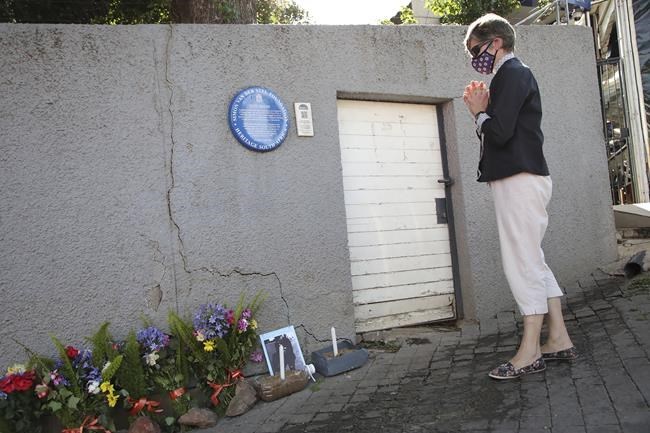
A woman stands outside the the historical home of Anglican Archbishop Desmond Tutu, in Soweto, Johannesburg, South Africa, Sunday, Dec. 26, 2021. South Africa's president says Tutu, South Africa's Nobel Peace Prize-winning activist for racial justice and LGBT rights and the retired Anglican Archbishop of Cape Town, has died at the age of 90. (AP Photo)
Republished December 26, 2021 - 12:11 PM
Original Publication Date December 26, 2021 - 11:21 AM
JOHANNESBURG (AP) — Desmond Tutu, South Africa’s Nobel Peace Prize-winning icon, an uncompromising foe of apartheid and a modern-day activist for racial justice and LGBT rights, died Sunday at 90. South Africans, world leaders and people around the globe mourned the death of the man viewed as the country’s moral conscience.
Tutu worked passionately, tirelessly and non-violently to tear down apartheid — South Africa’s brutal, decades-long regime of oppression against its Black majority that ended in 1994.
The buoyant, blunt-spoken clergyman used his pulpit as the first Black bishop of Johannesburg and later as the Anglican Archbishop of Cape Town, as well as frequent public demonstrations, to galvanize public opinion against racial inequity, both at home and globally.
Nicknamed “the Arch,” the diminutive Tutu became a towering figure in his nation’s history, comparable to fellow Nobel laureate Nelson Mandela, a prisoner during white rule who became South Africa’s first Black president. Tutu and Mandela shared a commitment to building a better, more equal South Africa.
Tutu’s death on Sunday “is another chapter of bereavement in our nation’s farewell to a generation of outstanding South Africans who have bequeathed us a liberated South Africa,” South African President Cyril Ramaphosa said.
Tutu died peacefully at the Oasis Frail Care Center in Cape Town, his trust said. He had been hospitalized several times since 2015 after being diagnosed with prostate cancer in 1997.
“He turned his own misfortune into a teaching opportunity to raise awareness and reduce the suffering of others,” said the Tutu trust.
Former U.S. President Barack Obama hailed Tutu as “a moral compass for me and so many others. A universal spirit, Archbishop Tutu was grounded in the struggle for liberation and justice in his own country, but also concerned with injustice everywhere. He never lost his impish sense of humor and willingness to find humanity in his adversaries.”
A seven-day mourning period is planned in Cape Town before Tutu’s burial, including a two-day lying in state, an ecumenical service and an Anglican requiem mass at St. George’s Cathedral in Cape Town. The southern city’s landmark Table Mountain will be lit up in purple, the color of the robes Tutu wore as archbishop.
Throughout the 1980s — when South Africa was gripped by anti-apartheid violence and a state of emergency gave police and the military sweeping powers — Tutu was one of the most prominent Black leaders able to speak out against abuses.
A lively wit lightened Tutu’s hard-hitting messages and warmed otherwise grim protests, funerals and marches. Plucky and tenacious, he was a formidable force with a canny talent for quoting apt scriptures to harness support for change.
The Nobel Peace Prize in 1984 highlighted his stature as one of the world’s most effective champions for human rights.
With the end of apartheid and South Africa’s first democratic elections in 1994, Tutu celebrated the country’s multi-racial society, calling it a “rainbow nation,” a phrase that captured the heady optimism of the moment.
Tutu also campaigned internationally for human rights, especially LGBTQ rights and same-sex marriage.
“I would not worship a God who is homophobic,” he said in 2013, launching a campaign for LGBTQ rights in Cape Town. “I would refuse to go to a homophobic heaven. No, I would say, ‘Sorry, I would much rather go to the other place.’”
Tutu grew disillusioned with the African National Congress, the anti-apartheid movement that became the ruling party after South Africa's 1994 election.
Tutu was particularly incensed by the South African government’s refusal to grant a visa to the Dalai Lama, preventing the Tibetan spiritual leader from attending Tutu’s 80th birthday as well as a planned gathering of Nobel laureates in Cape Town. The government rejected Tutu’s accusations that it was bowing to pressure from China, a major trading partner.
Tutu’s life was “entirely dedicated to serving his brothers and sisters for the greater common good. He was a true humanitarian,” the Dalai Lama said Sunday.
Desmond Mpilo Tutu was born Oct. 7, 1931, in Klerksdorp, west of Johannesburg, and became a teacher before entering St. Peter’s Theological College in Rosetenville in 1958. He was ordained in 1961 and six years later became chaplain at the University of Fort Hare.
He became bishop of Lesotho, chairman of the South African Council of Churches and, in 1985, the first Black Anglican bishop of Johannesburg. In 1986, Tutu was named the first Black archbishop of Cape Town.
As head of South Africa's Truth and Reconciliation Commission, Tutu and his panel listened to harrowing testimony about torture, killings and other atrocities during apartheid. At some hearings, Tutu wept openly.
The commission’s 1998 report lay most of the blame on the forces of apartheid, but also found the African National Congress guilty of human rights violations. The ANC sued to block the document’s release, earning a rebuke from Tutu. “I didn’t struggle in order to remove one set of those who thought they were tin gods to replace them with others who are tempted to think they are,” Tutu said.
Tutu is survived by his wife of 66 years, Leah, and their four children.
Asked once how he wanted to be remembered, he told The Associated Press: “He loved. He laughed. He cried. He was forgiven. He forgave. Greatly privileged.”
___
AP journalist Christopher Torchia contributed to this report.
News from © The Associated Press, 2021